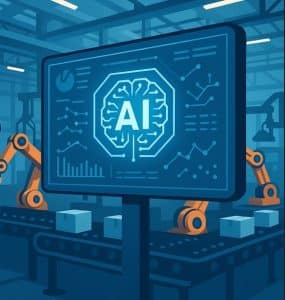
As part of the Interreg AT-SK project “Twin City Future Innovation Manufacturing Hub”, the second webinar in the “Future Skills & AI” series took place in mid-January.
Many thanks to the three speakers from 42 Vienna Digital Excellence Campus, RISC Software, and Avanade Austria for their valuable contributions.
“42 – The Education Model for 21st Century Skills”: Summary of the presentation by Tatjana Lulevic-Heyny, 42 Vienna – Digital Excellence Campus
The EU and OECD have declared the 2020s the Digital Decade, aiming to strengthen the connection between education and technology. If education fails to keep pace with technological developments, social inequality will grow. This is where 42 Vienna comes in – an innovative coding school with no traditional teachers or lectures. Instead, its model is based on peer-to-peer, project-based learning, fostering independent thinking and problem-solving.
42 Vienna is part of the international 42 network, which includes 56 campuses across 32 countries and has trained more than 44,000 graduates worldwide. The focus is not only on technical skills such as programming, IT security, and data science but also on key 21st-century skills: creativity, communication, teamwork, and initiative. 42 Vienna directly addresses the severe shortage of skilled workers – according to the Austrian Federal Economic Chamber (WKO), there are currently around 28,000 IT specialists missing in Austria alone. Its practical learning model helps young talent succeed both technically and personally in a digital world.
Two case studies illustrate how students at 42 Vienna tackle real-world challenges: In the first, an interdisciplinary team developed an app that automatically translates official documents into simplified language and the user’s native tongue. Born from personal experience, the project shows how combining diverse skills can lead to socially impactful solutions. The second case highlights the added value 42 Vienna students bring to companies – not just technical know-how, but a new mindset: collaborative, creative, and solution-oriented. The result is not only functional technology but sustainable innovation.
“AI Training and AI Assistance through the RISC AI Academy and KOALA”: Summary of the presentation by Bernhard Freudenthaler, RISC Software GmbH
RISC Software GmbH specializes in the development of advanced software and AI systems and conducts applied research in logistics, industry, medicine, and IT. Combining a non-university research center with a software company, RISC is unique in Austria. About 70% of its projects are contract research, underscoring its strong development capabilities – including custom-built solutions with ongoing support.
Artificial Intelligence is set to fundamentally transform the workplace by automating repetitive tasks and supporting better decision-making. Therefore, it’s essential that non-technical professionals, not just IT experts, learn to work confidently and effectively with AI systems. Failing to leverage AI’s potential means falling behind professionally. The RISC AI Academy addresses this gap by offering practical, hands-on training programs that provide a basic understanding of AI and how to use it meaningfully in daily work – tailored for both technical and non-technical audiences.
AI tools must be intuitive and user-friendly to be widely adopted. Once integrated into daily workflows, they can unlock major benefits. One example is KOALA (Knowledge-Oriented AI Language Assistant) – an AI-based assistant developed by RISC. KOALA allows secure access to internal company data via a familiar chat interface – GDPR-compliant, flexible, and easy to use.
“Rethinking Intelligent Productivity: Microsoft 365 Copilot and the Role of AI in the Modern Workplace”: Summary of the presentation by Doris Zeller, Avanade Austria GmbH
Avanade, a joint venture between Microsoft and Accenture, supports global clients with Microsoft technologies, particularly in the industrial sector. Over the past two years, the market for AI tools has evolved rapidly, with Large Language Models revolutionizing routine tasks. These tools now assist with daily activities and significantly boost efficiency across many business areas. The Microsoft 365 Copilot aims to reshape the workplace by simplifying decision-making and automating repetitive tasks. It’s already being piloted in many companies, with mixed but insightful results. A key focus is now on integrating various copilots more seamlessly to better connect enterprise data.
Initially designed for basic tasks like email summarization, the Copilot is evolving quickly. The next step is the development of specialized copilots tailored to departments and roles—solutions that deliver real value. For this, companies must actively prepare their employees, offering targeted training to ensure AI can be adopted effectively and meaningfully.
Use Cases in Production:
- Knowledge management and documentation: Important data and instructions are often unstructured or only stored in employees’ minds. Microsoft Copilot helps centralize this knowledge and make it accessible to all.
- Smart glasses and remote support: Using Hololens, technicians can access repair guides and manuals in real time while working on-site.
- Production data analysis: The Manufacturing Copilot helps analyze real-time production data to identify root causes of issues like equipment failures.
- Process optimization: Copilot detects optimization potential in real time—e.g., during machine adjustments or downtime—and supports data-based decision-making.
- Self-service tools: Automated tools improve efficiency by giving employees quick access to relevant information, such as documentation or compliance requirements.
